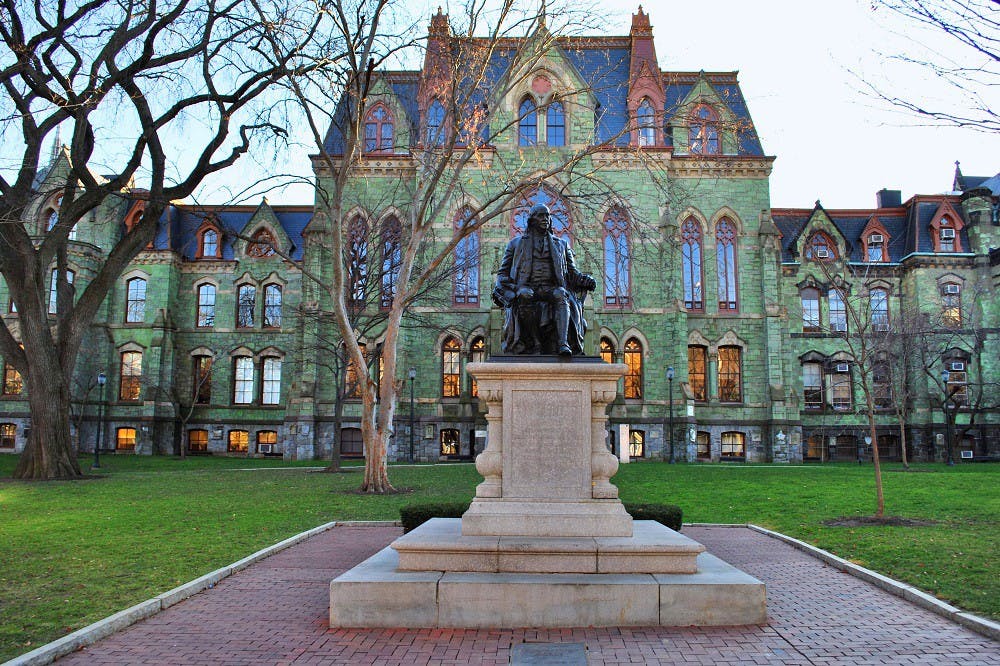
As a first-generation, low-income student, I hope to offer my perspective on legacy admissions.
First, the notion that the only way legacy students can contribute to the “prestige” of a university implies that FGLI students can not. The ways in which we measure success in America are inherently flawed. I can contribute just as much to Penn without the SAT score I could not afford to pay for through tutors, or an impressive resume I could not afford to pay for with an education from an expensive private school. And the fact that these measures contribute to a university’s ranking is a fault of the ranking system, not of the students who are shut out from contributing.
Being FGLI does not mean that I cannot have school spirit. I am proud of myself for being the only student accepted to Penn from my school district and motivated to help my peers have a seat at the table. If you want more school spirit, maybe get more students to attend football games.
With a $14 billion endowment and the best business school in the world, I am sure Penn can find other benefactors. MIT does not consider legacy, and its $17 billion endowment doesn’t look so shabby. Clearly, schools can be prestigious and wealthy independent of whether or not they consider legacy.
Let’s address the issue of people only crediting legacy students’ admission to the fact that their parents came here. I do not know the nuances of what determined the admission of individual students. I do know that legacy was a part of it, and while acceptances should not be discredited, we are upset that legacy is considered to begin with.
The American education system, and America as a whole, claims to be a meritocracy. Your success should be proportional to your labor. It takes legacy students zero effort to be legacy. So why do I, as a student who could not control where her parents went to college, have to work that much harder to offset these privileges?
This makes the issue of education directly intergenerational. If legacy students are favored in the admissions process, then the inverse is also true — non-legacy students will be put at a disadvantage, the most vulnerable of which are FGLI students. The educated stay educated and those who are not must unfairly work harder. Your parents going to college, never mind the fact that they went to this college, is a privilege in and of itself. My dad does not know what the SAT is, let alone how to prepare for it. He did not know what it took to make a competitive application so I had to teach myself and seek out limited resources by myself to get here.
My father was not undeserving of an education. He worked for months to pay for college application fees and was accepted. But when he checked his financial aid, he realized could not afford to enroll. Scholarships and financial aid do not suffice, they are contingent on you being poor enough for eligibility and are a limited resource. So he did not enroll, and went hungry for three months because of the application expenses. He immigrated to America and now works 12-hour days to attempt to provide my brother and I with the resources he was not afforded.
No amount of hard work would have given him the social capital Penn parents have. As a legacy student, even if your parents do not have the money to buy you an SAT tutor they will know what it takes to prepare for it. They will know the nuances of constructing a competitive application. All of these responsibilities were put on a fourteen-year-old version of me. How could I compete with the social capital wealth of legacy families? This is completely independent of the fact that non-legacy, wealthy students also benefit directly from social capital. And on top of all of these privileges, legacy counts again during the application cycle.
Education attainment is a vicious cycle: “Go to Penn and you too will gain wealth and prestige.” I agree, if legacy is considered, wealth, social capital, and education are concentrated within the most privileged applicants. Please take the time to acknowledge that legacy was created in the 1920s to keep high-achieving, first-generation Americans from being accepted into elite universities and disrupting the status quo. Education does not exist in a vacuum, it influences labor market outcomes and incarceration rates. Legacy allows for disadvantaged students to be shut off from having the opportunity to study at prestigious universities, and thus achieve social mobility. Legacy ensures that education is a privilege for the well-off. My father deserved an education, and so do I.
LUCIA GONZALEZ is a College freshman studying Political Science. Her email address is gonzluci@sas.upenn.edu.
The Daily Pennsylvanian is an independent, student-run newspaper. Please consider making a donation to support the coverage that shapes the University. Your generosity ensures a future of strong journalism at Penn.
Donate






